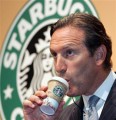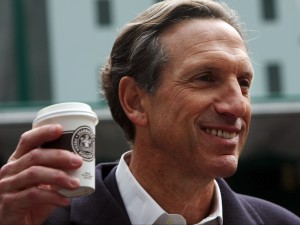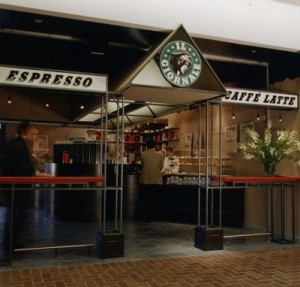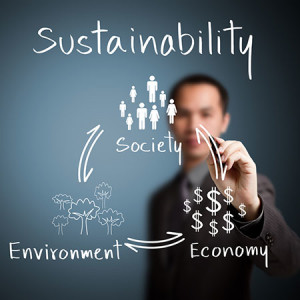On the Origins of Sustainability – Howard Schultz

 Howard Schultz is a man I admire.
Howard Schultz is a man I admire.
Back in January I wrote a piece, “Greenwash or Raw Milk for Big Business? Inside Starbucks,” about the ubiquitous coffee company, a signatory to the American Business Act on Climate Pledge. Schultz, 63, is its CEO/Chairman.
In 1982, Shultz first joined Starbucks Coffee Co. as Director of Marketing. He left 3 years later, failing to interest the founders in expanding Starbucks and its wholesale business, Peet’s Coffee and Tea, from a coffee/tea company into a cafe/restaurant selling  brewed drinks too. In 1986 he opened his first ‘Il Giornale’ cafe, modeled after a typical Milanese cafe and meeting place. 2 years later the founders of Starbucks, having some financial difficulties running 2 companies, sold the retail portion of the business, including the Starbucks name, to Shultz and Il Giornale. In 1992 Shultz folded Il Giornale into Starbucks and took it public.
brewed drinks too. In 1986 he opened his first ‘Il Giornale’ cafe, modeled after a typical Milanese cafe and meeting place. 2 years later the founders of Starbucks, having some financial difficulties running 2 companies, sold the retail portion of the business, including the Starbucks name, to Shultz and Il Giornale. In 1992 Shultz folded Il Giornale into Starbucks and took it public.
Schultz and 2 siblings were raised in public housing in Brooklyn. His father was a former Army medic who became a truck driver. His mother, staying at home to raise their 3, later became a receptionist. Schultz describes her as a strong-willed powerful woman. A natural athlete, Shultz fanned his competitive urges on the ball field or basketball court, including pickup games with black, Italian and Jewish kids, all his neighbors.
A little bit in the mold of Warren Buffett, Shultz may address ideas at Starbucks annual meetings that don’t strictly meet the reporting expectations of corporate profitability, cash flows or market penetration that stock analysts are poised for.
At last Wednesday’s shareholder meeting, Schultz, who is among those referred to as “conscientious capitalists,” had quite a bit on his mind.
“I’ve struggled for weeks to find the right words to express the pain I feel about where America is headed and the cloud hanging over the American people. There are moments when I’ve had a hard time recognizing who we are and who we are becoming. We are facing a test not only of our charcter but of our morality as a people.”
Recalling an occasion during his early boyhood when his mother took him to hear presidential candidate JFK speak, he told his audience that he had always thought of the American dream as a reservoir, “and it had constantly been replenished with values, work ethic and the spirit of the American people.” He went on to say, “Sadly, our reservoir is running dry–depleted by cynicism, despair, division, exclusion, fear and, yes, indifference.”
He went on to extoll his audience to refill the reservoir of the American Dream: “not with cynicism, but with optimism. Not with despair, but with possibility. Not with division, but with unity. Not with exclusion, but with inclusion. Not with fear, but with compassion. Not with indifference, but with love.”
Where Schultz spikes it for me on the subject of sustainability is when he closed the meeting telling a story about his “sage rabbi”. The rabbi taught Schultz about Jews who “were being transported to concentration camps during the Holocaust. Only a fraction of them had received blankets, and they had to decide whether to share the blankets with those who had none.” (source: The Washington Post)
So, for the audience at this year’s shareholder meeting Schultz implored: “I ask you today to share your blanket with others, regardless of the color of their skin, regardless of their religion, regardless of their gender, regardless of their sexual orientation, regardless of their station in life or their politics. Let’s fill our reservoir back up with the true promise of our country and once again embrace what it means to be Americans.”
Sustainability, in its broadest terms, is about community, about caring for each other and, yes, demanding a healthy environment that supports one and all; richer or poorer, well-connected or marginalized, highly educated or living on street smarts.

Incidentally, Shultz has co-written 2 books: Pour Your Heart Into It: How Starbucks Built a Company One Cup at a Time in 1997; and, How Starbucks Fought for Its Life Without Losing Its Soul in 2011.